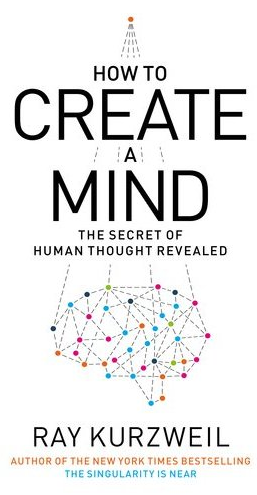 How to Create a Mind: The Secret of Human Thought Revealed
How to Create a Mind: The Secret of Human Thought Revealed is Ray Kurzweil's latest book. You may know of him as the author of The Singularity Is Near: When Humans Transcend Biology
. Kurzweil is a "futurist" and has a reputation as being one of the greatest thinkers of our age, as well as being One of the greatest hucksters of the age, depending on whom you ask. In his new book...
Kurzweil presents a provocative exploration of the most important project in human-machine civilization—reverse engineering the brain to understand precisely how it works and using that knowledge to create even more intelligent machines.
Kurzweil discusses how the brain functions, how the mind emerges from the brain, and the implications of vastly increasing the powers of our intelligence in addressing the world’s problems. He thoughtfully examines emotional and moral intelligence and the origins of consciousness and envisions the radical possibilities of our merging with the intelligent technology we are creating.
Certain to be one of the most widely discussed and debated science books of the year, How to Create a Mind is sure to take its place alongside Kurzweil’s previous classics.
I think there are three key ideas in this book about which I have varying opinions. First, he presents a model of how the brain works. Second, he suggests that we can, in essence, reverse engineer the brain using computing technology. Third, he discusses the rate at which computing technology becomes more capable of doing such a thing, both qualitatively and quantitatively. He ties these idea together with reference to artificial intelligence theory.
Regarding the second point, I have no doubt that we will someday be able to produce a non-biological brain. Brains are physical entities that emerge with very little specification as to architecture, have incredibly dense circuitry that carries enough information for otherwise reasonable people to assert that its information storage capacity is infinite (which it is not, of course), and that involves interactivity among components that allows for some amazing things to happen. I think that when we get close to making a mechanical brain, we would probably want to set aside many of the ways in which actual brains function, in order to create a more effective computing solution, because the brain is a product of Natural Selection and is thus not necessarily all that well deigned. The trick will be sorting out that which is good design for mechanical implementation of human braininess from that which is not good design. Regarding the third point, the expansion of computational abilities, I'm sure the basic ideas Kurzweil lays out are reasonable but furturism about technology seems to run into the same problem over and over again: Somebody invents a qualitatively distinct way of doing something that totally changes the game, and after that, this new way of doing things quantitatively evolves. Predicting the qualitative shifts has been difficult.
My biggest problem with Kurzweil's book is in relation to the first point, a theory about how the brain's cortex works. He asserts that the cortex is a self organizing entity that responds to information, creating an ability to manage and recognize patterns. My problem with this is that Kurzweil seems to have not read Deacon's work (such as The Symbolic Species: The Co-evolution of Language and the Brain and Incomplete Nature: How Mind Emerged from Matter
. I'm not saying that Kurzweil is wrong in thinking of the cortex as self organizing in response to the challenges and inputs of pattern recognition. I'm simply saying that this property of the cortex, and of the human mind, has already been identified (mainly by Deacon) and that Kurzweil should sit down with Deacon and have a very long conversation before writing this book! (Well, ok, the next book.) I don't think they've done that yet.